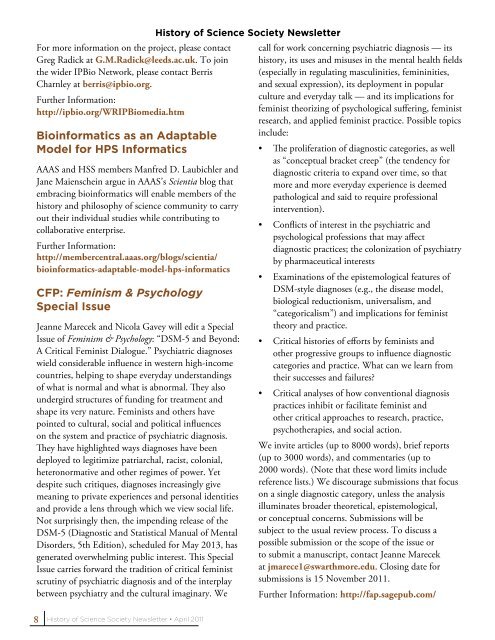Printer friendly version of Newsletter - History of Science Society
Printer friendly version of Newsletter - History of Science Society
Printer friendly version of Newsletter - History of Science Society
Create successful ePaper yourself
Turn your PDF publications into a flip-book with our unique Google optimized e-Paper software.
For more information on the project, please contact<br />
Greg Radick at G.M.Radick@leeds.ac.uk. To join<br />
the wider IPBio Network, please contact Berris<br />
Charnley at berris@ipbio.org.<br />
Further Information:<br />
http://ipbio.org/WRIPBiomedia.htm<br />
Bioinformatics as an Adaptable<br />
Model for HPS Informatics<br />
AAAS and HSS members Manfred D. Laubichler and<br />
Jane Maienschein argue in AAAS’s Scientia blog that<br />
embracing bioinformatics will enable members <strong>of</strong> the<br />
history and philosophy <strong>of</strong> science community to carry<br />
out their individual studies while contributing to<br />
collaborative enterprise.<br />
Further Information:<br />
http://membercentral.aaas.org/blogs/scientia/<br />
bioinformatics-adaptable-model-hps-informatics<br />
CFP: Feminism & Psychology<br />
Special Issue<br />
Jeanne Marecek and Nicola Gavey will edit a Special<br />
Issue <strong>of</strong> Feminism & Psychology: “DSM-5 and Beyond:<br />
A Critical Feminist Dialogue.” Psychiatric diagnoses<br />
wield considerable influence in western high-income<br />
countries, helping to shape everyday understandings<br />
<strong>of</strong> what is normal and what is abnormal. They also<br />
undergird structures <strong>of</strong> funding for treatment and<br />
shape its very nature. Feminists and others have<br />
pointed to cultural, social and political influences<br />
on the system and practice <strong>of</strong> psychiatric diagnosis.<br />
They have highlighted ways diagnoses have been<br />
deployed to legitimize patriarchal, racist, colonial,<br />
heteronormative and other regimes <strong>of</strong> power. Yet<br />
despite such critiques, diagnoses increasingly give<br />
meaning to private experiences and personal identities<br />
and provide a lens through which we view social life.<br />
Not surprisingly then, the impending release <strong>of</strong> the<br />
DSM-5 (Diagnostic and Statistical Manual <strong>of</strong> Mental<br />
Disorders, 5th Edition), scheduled for May 2013, has<br />
generated overwhelming public interest. This Special<br />
Issue carries forward the tradition <strong>of</strong> critical feminist<br />
scrutiny <strong>of</strong> psychiatric diagnosis and <strong>of</strong> the interplay<br />
between psychiatry and the cultural imaginary. We<br />
<strong>History</strong> <strong>of</strong> <strong>Science</strong> <strong>Society</strong> <strong>Newsletter</strong><br />
call for work concerning psychiatric diagnosis — its<br />
history, its uses and misuses in the mental health fields<br />
(especially in regulating masculinities, femininities,<br />
and sexual expression), its deployment in popular<br />
culture and everyday talk — and its implications for<br />
feminist theorizing <strong>of</strong> psychological suffering, feminist<br />
research, and applied feminist practice. Possible topics<br />
include:<br />
• The proliferation <strong>of</strong> diagnostic categories, as well<br />
as “conceptual bracket creep” (the tendency for<br />
diagnostic criteria to expand over time, so that<br />
more and more everyday experience is deemed<br />
pathological and said to require pr<strong>of</strong>essional<br />
intervention).<br />
• Conflicts <strong>of</strong> interest in the psychiatric and<br />
psychological pr<strong>of</strong>essions that may affect<br />
diagnostic practices; the colonization <strong>of</strong> psychiatry<br />
by pharmaceutical interests<br />
• Examinations <strong>of</strong> the epistemological features <strong>of</strong><br />
DSM-style diagnoses (e.g., the disease model,<br />
biological reductionism, universalism, and<br />
“categoricalism”) and implications for feminist<br />
theory and practice.<br />
• Critical histories <strong>of</strong> efforts by feminists and<br />
other progressive groups to influence diagnostic<br />
categories and practice. What can we learn from<br />
their successes and failures?<br />
• Critical analyses <strong>of</strong> how conventional diagnosis<br />
practices inhibit or facilitate feminist and<br />
other critical approaches to research, practice,<br />
psychotherapies, and social action.<br />
We invite articles (up to 8000 words), brief reports<br />
(up to 3000 words), and commentaries (up to<br />
2000 words). (Note that these word limits include<br />
reference lists.) We discourage submissions that focus<br />
on a single diagnostic category, unless the analysis<br />
illuminates broader theoretical, epistemological,<br />
or conceptual concerns. Submissions will be<br />
subject to the usual review process. To discuss a<br />
possible submission or the scope <strong>of</strong> the issue or<br />
to submit a manuscript, contact Jeanne Marecek<br />
at jmarece1@swarthmore.edu. Closing date for<br />
submissions is 15 November 2011.<br />
Further Information: http://fap.sagepub.com/<br />
8 <strong>History</strong> <strong>of</strong> <strong>Science</strong> <strong>Society</strong> <strong>Newsletter</strong> • April 2011
















